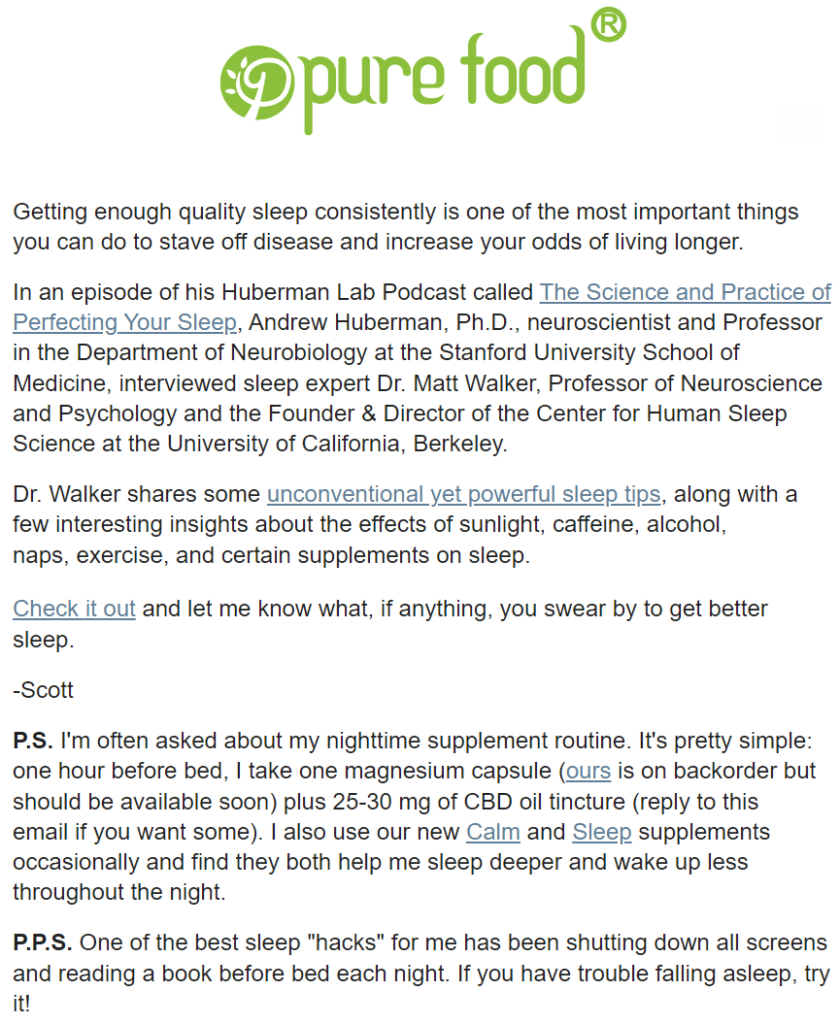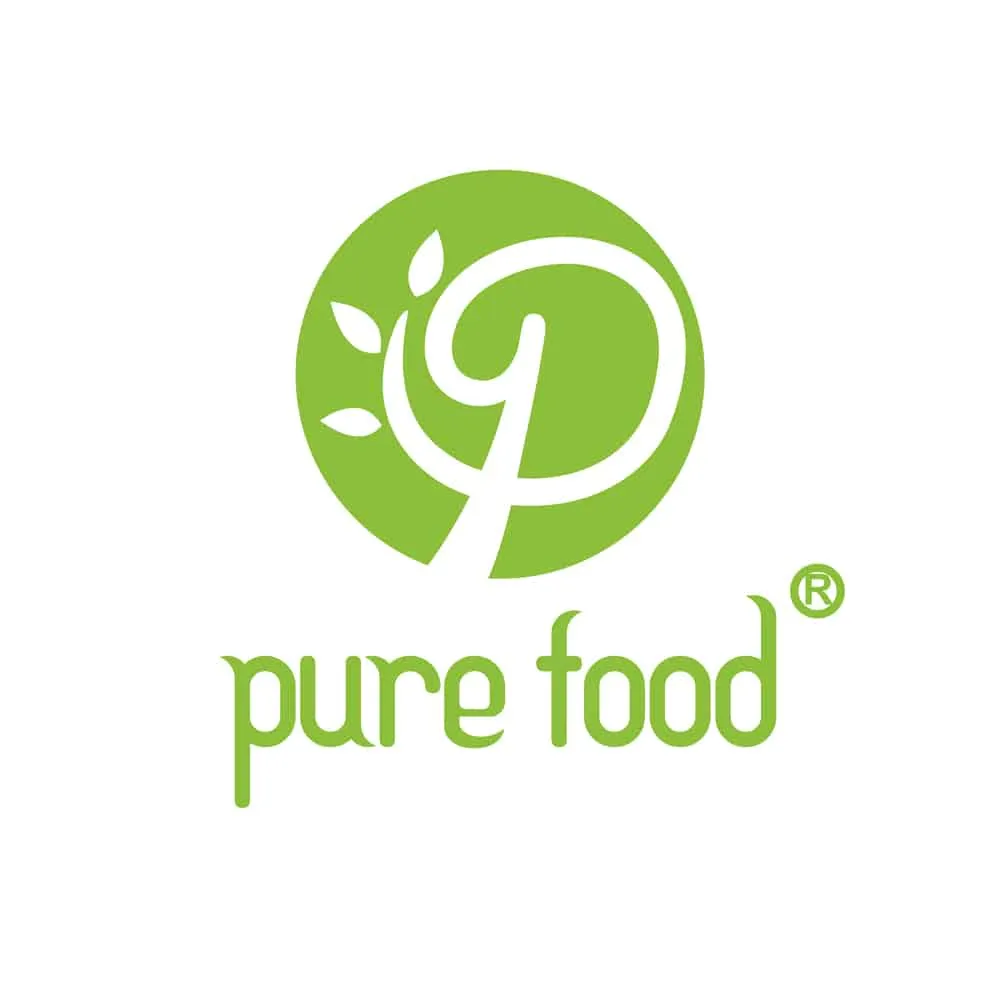Not every email has to sell your product. I mean, most should. You can’t make email money if you don’t sell in your emails.
But if you’re passionate about your niche — if you live and breathe it — you won’t mind focusing some emails on great stuff you hear from people your market knows and appreciates.
For example, perhaps you hear an excellent podcast episode. You might share it with your audience and use it to start a conversation with them. If you’re clever, you can slide sales pitches in without even “selling.”
Let’s look at an email that does this well.
About Pure Food Company
Pure Food Company is an online health/fitness supplement company selling products that can potentially help in the areas of:
- Muscle gain
- Fat loss
- Brain/gut/immune/heart health
- Pain/stress
- Sleep
It was founded by Scott Christ in 2014 as a different business — a “spice of the month” club.
However, Scott didn’t find too much success with that, so he pivoted several times until he landed on becoming a supplement company. One that sold supplements without fillers, sweetened, and other junk ingredients.
Pure Food Company launched its first product in August 2015, and Scott packed and shipped everything from his basement. He created and sold more products, and years later, he has a thriving eCommerce business.
It’s a simple story, but that’s fine. Pretty relatable, in fact. It’s the “scrappy entrepreneur building a business out of his basement” thing. Lesson in there.
The Email: Sharing Niche Content… and Linking Your Products To It
We’ve got a short email today. This one’s sharing market-relevant content from other sources/creators/professionals/experts:


Not much else to say here. Let’s get into why I love this email…
The Subject Line and Sender Name
The subject line is a perfect example of “clear and simple is better”:

I prefer sentence-case subject lines, but hey, maybe this is Scott’s style. If he’s built a strong bond with his audience, no big deal.
Now take a look at this sender name:

I assume Scott himself writes most of these emails. Not too hard to handle the marketing yourself when most of your marketing and sales efforts involve writing a few emails.
Also, “Scott at Pure Food Company” feels more personal than “Pure Food Company”.
That builds a stronger relationship with the customer.
But for this email in particular, it enhances the “I’m just sharing helpful stuff I heard elsewhere” effect of the content he shares in the body.
The Body Copy
The email starts with a somewhat “duh” statement that this target market in particular will be enthusiastic about:

Everyone wants to live longer (within reason) and healthier. But stuff like this gets Pure Food’s target market going because, well, they’re more health-conscious.
So this first piece of copy bridges the subject line to the meat of the email, the sleep tips the reader wants. It’s just long enough to set the stage but doesn’t add fluff about how great sleep is. The reader already knows that.
Onto the next paragraph:

Dr. Andrew Huberman has experienced a meteoric rise in the YouTube and podcast space. According to Wikipedia, Dr. Huberman (who holds a Ph.D. from UC Davis in neuroscience) has made “contributions to the brain development, brain plasticity, and neural regeneration.”
He’s often associated with self-improvement types of circles. Many of his listeners apply his teachings to enhance their mental performance and productivity.
Dr. Matthew Walker’s Ph.D. is in neurophysiology. He’s best known for his expertise on the science of sleep. His book, Why We Sleep, is a great read. I highly recommend it.
Both men have been on the Joe Rogan Experience (among other podcasts).
We have a true meeting of the minds (wow, that’s meta) here. Most of the target market probably knows who Dr. Huberman is. I bet many listen to him. A fair bit of them (albeit fewer) know or have heard of Dr. Walker, too.
In short: The concepts of authority and expertise do the heavy lifting here. Readers want to know what juicy health stuff they can learn…

The email, therefore, gives us a short description of the episode’s content.
Just enough to get the reader excited to listen and nothing more.
So we get to the CTA:

I like how Scott encourages his subscribers to reply with their own tips/experiences on how they get good sleep.
As I often discuss, facilitating discussions with subscribers helps you strengthen your relationships with customers. This:
- Increases revenues and customer lifetime value (They want to buy more from you as they trust you more)
- Lowers customer acquisition costs (You don’t have to spend as much on ads if you get more revenue from the same customers)
Replies and engagement also help with deliverability — it tells the email provider you aren’t some “slimy salesman” but a trusted sender. More deliverability = more eyes on your emails = more sales.
Scott doesn’t miss an opportunity to sell, though, but he doesn’t hard sell. He links the CTA and signoff with the PS in a clever fashion:

Scott isn’t explicitly saying, “buy these products”. He’s simply telling you what he uses to improve his sleep. Linking to the products doesn’t change the context or tone of the sentence, but it does let the reader click if they’re interested.
Also, the owner saying that he uses his products (without exaggerating his usage) adds a little dose of social proof.
Great technique. In context, it’s even better — it’s right after asking the reader to share sleep tips.
See what I mean? He’s keeping it conversational. You share your sleep tips, and he shares his. His just happen to be his own products that you can buy through those links.
(Also, PS’s draw the eyes of skimmers. Another reason placing these links in the PS is smart).
One other thing I like is that he mentions his magnesium supplement is on backorder yet still links to it. That’s more social proof (the supplement is so popular it’s on backorder) and nudges the reader towards clicking through to the product and requesting a notification when it’s back in stock.
We’re not done, though:

Closing things out with another sleep tip that lacks a product link strengthens that conversational tone.
And again, it draws the eyes of skimmers. Their eyes may pass over the links in the first PS and close more sales.
Great way to end the email.
Takeaways
Scott’s here to help the reader, first and foremost. That’s the main takeaway — put the customer first, and the money will come later.
In terms of copy:
Scott didn’t have to work too hard to sell the podcast. Huberman and Walker are big names to this audience.
He just had to give the reader the big benefit of the podcast so they know what they’re getting when they click…
Then add several implicit CTAs (and one explicit CTA) to give readers of several awareness levels opportunities to click.
Yet Scott still cleverly worked in sales pitches for his own products without breaking from a conversational feel.
As you can see, there’s a lot more to a “short and simple” email than you think.
One other note: Sharing other peoples’ stuff can pay off massively down the road.
Who knows? Maybe a big player in your niche discovers you’re the source of a bunch of recent traffic…
Checks out your business/website…
And then reaches out to discuss having you on their podcast/blog or setting up some other collaboration.
Once again — it never hurts to be helpful.
What to Do Next
- Get on my email list using the signup form below.
- Reach out to me if you want help writing emails like this one.
- Check out Pure Food Company for a wide range of excellent supplements.
